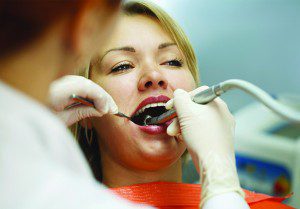By Dr. Alexander Gaukhman
 It doesn’t matter if you are the highest rated celebrity or the poorest man in the country. Oral cancer hits without warning, and if the disease is not caught early, death sentence is almost
It doesn’t matter if you are the highest rated celebrity or the poorest man in the country. Oral cancer hits without warning, and if the disease is not caught early, death sentence is almost
inevitable.
Estimations showed, that almost 8,000 are most likely to die from the disease, because they have been diagnosed in such a late stage of the disease when there is little that can be done from a clinical point of view.
“Comprehensive dental examinations that include a screening for oral cancer will save lives,” says Dr. Alexander Gaukhman. “Screenings for oral cancer are a routine part of dental exams at out office.”
The exam takes less than five minutes and involves a careful visual inspection of your lips, cheeks, gums, tongue and throat. The dentist will check for swelling or any changes in the color or texture of mouth tissues. The dentist will also feel the floor of the mouth, the tongue and areas beneath the jawbone to check for growths or other abnormalities.
Many kinds of mouth ulcers, minor injuries or sores can resemble an early state of cancer. But if what you think is a cold sore or an injury from biting your cheek doesn’t heal in two weeks, have it examined by a dentist who can determine the next steps.
“Annual oral cancer screenings are one of the best methods we have to help control the rate of the disease,” says Dr. Gaukhman. “It’s a fast and painless exam that aims to discover any health issues while they’re minor and easily treatable,” he says.
Signs and Symptoms of Oral Cancer
Oral cancer can affect any area of the mouth, including the gums, tongue, cheeks, roof of the mouth, lips, and hard or soft palate. The tongue is the most common area to develop intra-oral cancer with the floor of the mouth close behind.
Individuals can look for the following signs & symptoms:
• White patches, mixed red & white patches and/or
bright red smooth patches
• Sores on the face, neck, lips or mouth that haven’t
healed in two weeks
• Difficulty swallowing
• Swellings or lumps in your neck, lips or mouth
• Bleeding in your mouth
• Numbness, pain and/or loss of feeling in your face,
neck or mouth
• Hoarseness that lasts for a long time
While self-examination is recommended, these signs & symptoms can be caused by many other conditions that are not cancer. But it is prudent to be cautious. There is no substitute for having annual examinations at your dental office. As stated above, early detection is the key to higher survival rates.
According to the Oral Cancer Foundation, oral cancers that are detected in their early stages offer a survival rate of 80 to 90 percent.
Risk factors for oral cancer include:
Tobacco–Almost 90% of individuals that develop oral cancer use tobacco in the form of cigarettes, cigars and pipes or as “snuff” [chewing tobacco]. The risk increases with the amount of tobacco taken and the longevity of the habit.
Excessive Alcohol Consumption–About 75-80% of all oral cancer patients drink a lot of alcoholic beverages. The combination of smoking and excessive alcohol is a combination that significantly increases a person’s chance of developing oral cancer.
Exposure to Sunlight–Constant exposure to the ultraviolet light from the sun greatly increases the odds of developing cancer of the lip.
Age–The majority of people who are diagnosed with oral cancer are over 40 years old. The likelihood of developing oral cancer increases with age. Half of all patients with oral cancer are over 65.
Irritation –Chronic, long-term irritation of the soft tissue in the mouth causes sores and ulcers that may be precancerous. Poorly fitting dentures have been implicated as a risk factor for developing oral cancer. However, there have been research studies that have shown no difference between denture wearers and non-denture wearers in the incidence of oral cancer. There is some speculation that ill-fitting dentures tend to trap proven causative agents such as tobacco particles and alcohol residue against the gum tissue, thus increasing the chance of oral cancer developing.
Dentures can be stabilized so that rubbing against the gum tissue causing irritation can be minimized.
It is extremely important to understand that almost al types of oral cancers can be treated, but only if diagnosed early. In order to be able to catch the disease in its early stage, regular oral cancer screenings are of paramount importance. All it takes are five minutes of your time, for the dentist to have a look in your mouth for possible tissue changes. That’s it.
Siesta Dental
SiestaDental.com
Sarasota
5223 Avenida Navarra
Sarasota, FL 34242
(941) 266-7000
Osprey
416 S. Tamiami Tr. Suite F1
Osprey, FL 34229
(941) 497-5650







